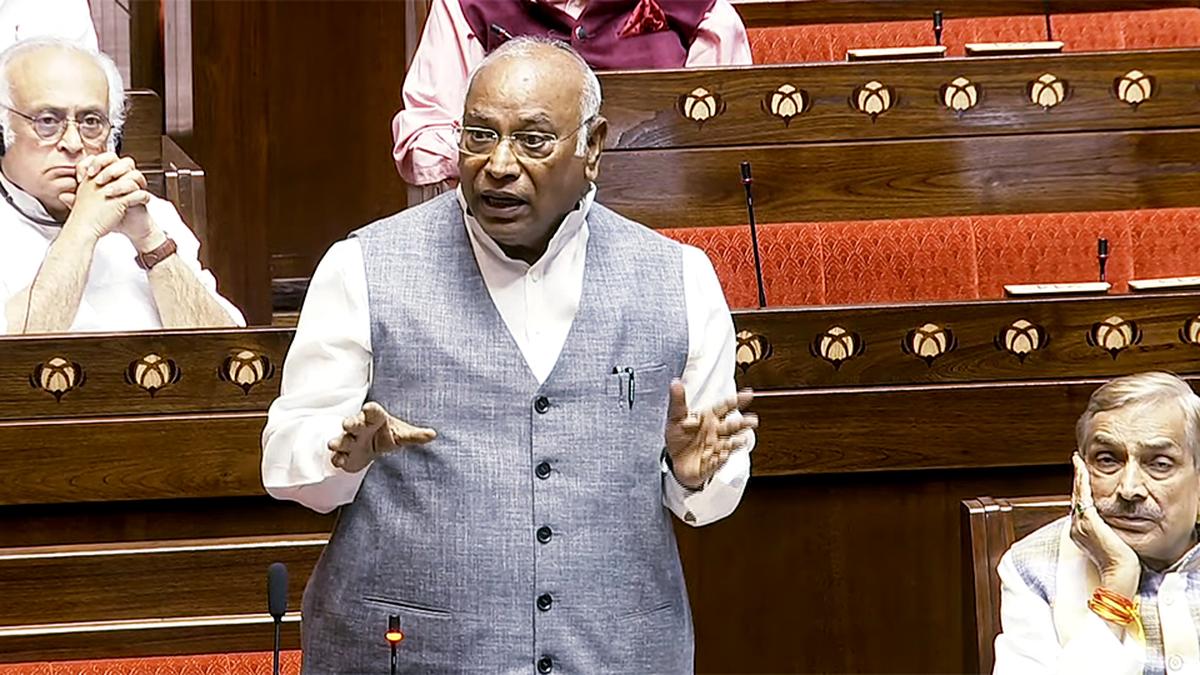Leader of Opposition in the Rajya Sabha Mallikarjun Kharge on Thursday (April 3, 2025) said the government is trying to sow the seeds of conflict by suppressing Muslims through the Waqf (Amendment) Bill and appealed to the ruling party not to disturb peace and harmony in the country.
Participating in the discussion on the bill in the Upper House, Mr. Kharge, also the Congress president, said the legislation is “unconstitutional” and is not good for the Indian Muslims. He urged the government to withdraw the bill which has a lot of “mistakes” and not make it a prestige issue.
Waqf (Amendment) Bill in Rajya Sabha LIVE
He also accused the NDA government of trying to create trouble for the Muslim community and the bill seeks to destroy them by usurping their properties.
Mr. Kharge alleged that the ruling dispensation wants to take away the land of Muslims and hand it over to its corporate friends.
He accused the government of failing to utilise funds earmarked for the minorities even though it is talking about poor Muslims and Pasmanda Muslims.
Mr. Kharge also alleged that ever since the BJP-led NDA government came to power, ₹3,574 crore out of a total of ₹18,274 crore allocated for minorities was returned as the amount remained unspent.

He urged Home Minister Amit Shah to withdraw the bill.
“I appeal to the home minister to kindly withdraw the bill. Don’t make it an issue of prestige. If there are errors and mistakes why don’t you correct them?” he said.
“We have peace and harmony in this country. You please maintain that and you don’t try to disturb that,” he added.
Mr. Kharge said the Waqf bill is meant to ” harass” the minorities. Had it been changed from the 1995 Act, we would have accepted it. There is nothing in the bill and people are opposing it, he added.
He said the BJP had accepted the 1995 Act and there was no need for bringing amendments with clauses aiming to “afflict people with problems”.
Opposing certain provisions of the bill, the Congress leader said the survey commissioner and additional commissioner who conduct the preliminary survey of the property have been replaced with the collector.
Kharge on Waqf bill
The bill proposes replacing ‘elected member’ with ‘nominated members’ on the Waqf board. “It means you want to take control in your hands. Their intention is not good,” he said.
“They want to collect all properties and make land banks and give it to corporates or businessmen. What they want to do, it is still not known.
“You are selling public sector properties. If you get something for free, you want to give it for the buffet as if whoever comes first can eat,” he added.
He also objected to the provision that the government properties identified as Waqf will no longer be considered as Waqf property.
“Now, the district collector will determine ownership in case of uncertainty and update revenue records. How can the collector do that?” he asked.
He further said earlier, MPs, former judges and eminent persons appointed to the central waqf board would be Muslims. Now the bill removed it and proposes that “two members should be non-Muslims. “Why non-Muslims are brought in?” he said, asking if any Muslims are included in the Tirupati Trust and Ram Mandir trust.
He said even Dalits are not included in these temple trusts.
Mr. Kharge accused the government of trying to oust Muslims from the Waqf board and include non-Muslims through this bill. “You are only foraying into these territories to harass Muslims,” he added.
Inclusion of women on the Waqf board was there earlier and nothing new has been done, he said.
“If you want to stifle the Muslims, this cannot be done. Don’t sow the seed of conflict,” he said.
Earlier participating in the debate, Kerala Congress (M) leader Jose K Mani by and large opposed the bill but acknowledged the positive provision that allows the Waqf board decision to be challenged in the court of law but demanded the government to make it retrospective.
Citing the Munambam case in Kerala, he said around 610 families belonging to various religions now face the threat of losing their lands due to Waqf claims. These communities lived peacefully with legally registered land and paid legitimate taxes to the government.
P P Suneer (CPI) opposed the bill, saying “it is an assault on secularism and equality.” “By taking away the key legal protection and centralising controls, the bill paves the way for state interference in religious endowments, violating many fundamental rights,” he said.
Vaiko (MDMK) opposed the bill and said it is an “obnoxious, anti-federal, anti-democratic and anti-secular bill. It should be withdrawn.” The bill proposed major changes in governance and regulation of Waqf board. “We strongly oppose the anti-minority bill. It is divisive and the anti-Muslim agenda was obvious. What was so obvious was the bringing of the Waqf administration from the state to the central government. Unfortunately, this aspect has gone unnoticed,” he said.
K R Suresh Reddy (BRS) opposed the bill and said 75% of the content of the bill can be done through an administrative process and there is no need for the bill.
“The content of the bill is good, but intent is doubtful. This is what everyone is discussing. A good facade is been created. Behind this facade, a polarisation is attempted,” he said.
Sushmita Dev (TMC) said, “The bill reeks of mistrust.” A managing trustee of the Waqf board can be removed from his position on the grounds if he is a member of the organisation which is banned under UAPA, she said, adding that the bill is unconstitutional.
Imran Pratapgarhi (Congress) said, “This bill is not a ray of hope. The majority of citizens are doubtful that the effort is to take away the property and give it to the rich.”
Published – April 03, 2025 11:45 pm IST
